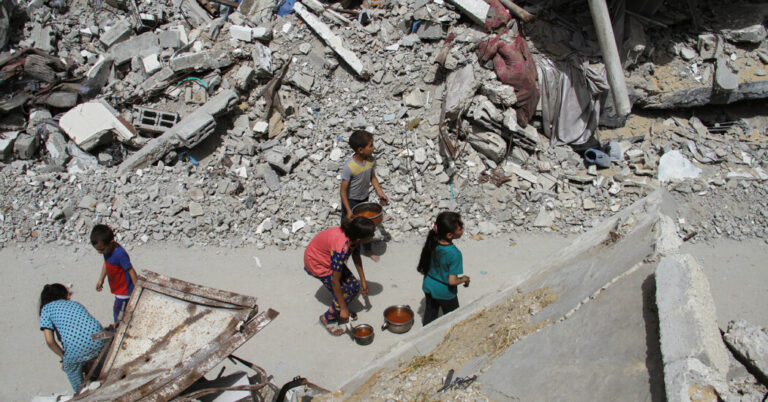Under intense international scrutiny, Israel accelerated the flow of aid to Gaza this month, but aid groups say more is needed as famine grips the enclave, particularly in the devastated north.
Israel’s efforts — which include opening new aid routes — were recognized last week by the Biden administration and international aid officials. More aid trucks appear to be arriving in Gaza, particularly in the north, where experts have been warning for weeks that famine is imminent.
The increase in aid levels is a good sign, but it is too early to say that looming famine is no longer a risk, said Arif Husain, chief economist of the United Nations World Food Program.
“This can’t happen for one day or one week – it has to happen every day for the foreseeable future,” Husain said, adding that the main need was for more food, water and medicine. “If we can do this, we can relieve pain and avoid starvation. »
Aid groups have long complained that only a trickle of aid enters the enclave, blaming harsh wartime conditions, strict inspections and limits on the number of crossing points. Israel argued that the restrictions were necessary to ensure that neither weapons nor supplies fell into the hands of Hamas.
But under pressure from President Biden following an Israeli airstrike that killed seven aid workers from World Central Kitchen, Israel announced this month that it open more aid routes.
Aid has since arrived in Gaza through new routes, including a partially functioning border crossing to northern Gaza and the Israeli port city of Ashdod, about 20 miles north of the enclave.
Infrastructure work is underway to make the northern crossing permanent and open another one nearby, said Shani Sasson, a spokesperson for COGAT, the Israeli agency that oversees policy for the Palestinian territories and liaises with international organizations.
Today, about 100 trucks a day reach the northern half of the Strip via two main southern crossings, according to Israeli and U.S. officials, compared with a total of 350 trucks during most of March.
Shipments of flour from the World Food Program have started arriving in Ashdod, Husain said, increasing the scale and efficiency of flour deliveries to northern Gaza in particular. Four the bakeries have reopened in Gaza City this month, in what the Israeli military called a sign of improving conditions.
The United Nations shared a video online showing bags of flour piled up in storerooms at a bakery and Palestinian children cheering for an aid truck.
Defense Department officials said Thursday that Army engineers had begun construction of a floating pier off the coast of Gaza. The shipping route is expected to open in the coming weeks and could allow rescue workers to deliver up to two million meals a day.
Additionally, the Jordanian military and government have recently increased the volume of aid arriving in land convoys, which depart from Jordan, pass through the West Bank and pass through part of Israel before reaching the southern Gaza border crossings. . The Jordanian army carries out its own inspections. Government trucks are inspected by Israel.
Yet the amount of aid that will actually reach Gaza is disputed, with Israel and the United Nations using different methods to track truck deliveries.
Ms. Sasson says the number of trucks entering Gaza daily has doubled in recent weeks to a daily average of 400. But the United Nations has reported a significantly smaller increase. In the two weeks ending Thursday, the most recent day for which figures were available, the study found that an average of 189 trucks entered Gaza each day through the two main southern crossings, although this number fluctuated considerably.
Trucks controlled and counted by Israel often enter Gaza only half full, according to UN officials, and it sometimes takes more than a day for trucks to reach Gaza warehouses, affecting the daily counts.
In addition to discrepancies in the total amount of aid, tensions remain high over Israel’s claim that 19 Palestinian employees of UNWRA, the United Nations that aids Palestinians, aided Hamas during its October 7 attack, in which 1,200 Israelis were killed. On Friday, the United Nations investigative office said it had closed the case against an employee, saying Israel had provided no evidence to support the allegations against him.
In addition, four other cases against UNRWA employees were suspended because the information provided by Israel was not sufficient for the United Nations internal oversight office to open an investigation, the United Nations said.
Suspended cases could be reopened if additional evidence is presented, according to UNRWA, and more than a dozen staff members remain under investigation.
Israeli Ministry of Foreign Affairs did not respond to a request for comment on the matter.
Accusations that UN workers were involved in the Hamas-led attack prompted a dozen countries to suspend billions in agency fundingwhich provides a vital lifeline of aid, water and shelter for many people in Gaza.
Germany, the agency’s second-largest donor after the United States, has since said it resume financing for UNRWA, but U.S. officials have not said whether they would follow suit.


